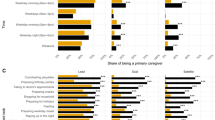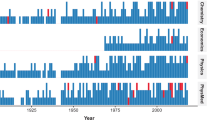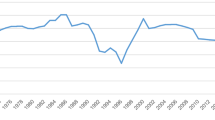Abstract
An analysis of a sample of entries in the 1969 edition of Who's Who, suggests that male arts specialists are nearly five times as likely as scientists to remain single.
This is a preview of subscription content, access via your institution
Access options
Subscribe to this journal
Receive 51 print issues and online access
$199.00 per year
only $3.90 per issue
Buy this article
- Purchase on Springer Link
- Instant access to full article PDF
Prices may be subject to local taxes which are calculated during checkout
Similar content being viewed by others
References
Hudson, L., Contrary Imaginations (Methuen, London, 1966).
Hudson, L., Frames of Mind (Methuen, London, 1968).
Hudson, L., Nature, 213, 228 (1967).
Galton, F., Hereditary Genius (Macmillan, London, 1869).
Webb, J. E., et al., Unobtrusive Measures: Non-reactive Research in the Social Sciences (Rand McNally, New York, 1966).
Who's Who (Black, London, 1969).
Author information
Authors and Affiliations
Rights and permissions
About this article
Cite this article
HUDSON, L., JACOT, B. Marriage and Fertility in Academic Life. Nature 229, 531–532 (1971). https://doi.org/10.1038/229531a0
Issue Date:
DOI: https://doi.org/10.1038/229531a0
Comments
By submitting a comment you agree to abide by our Terms and Community Guidelines. If you find something abusive or that does not comply with our terms or guidelines please flag it as inappropriate.



